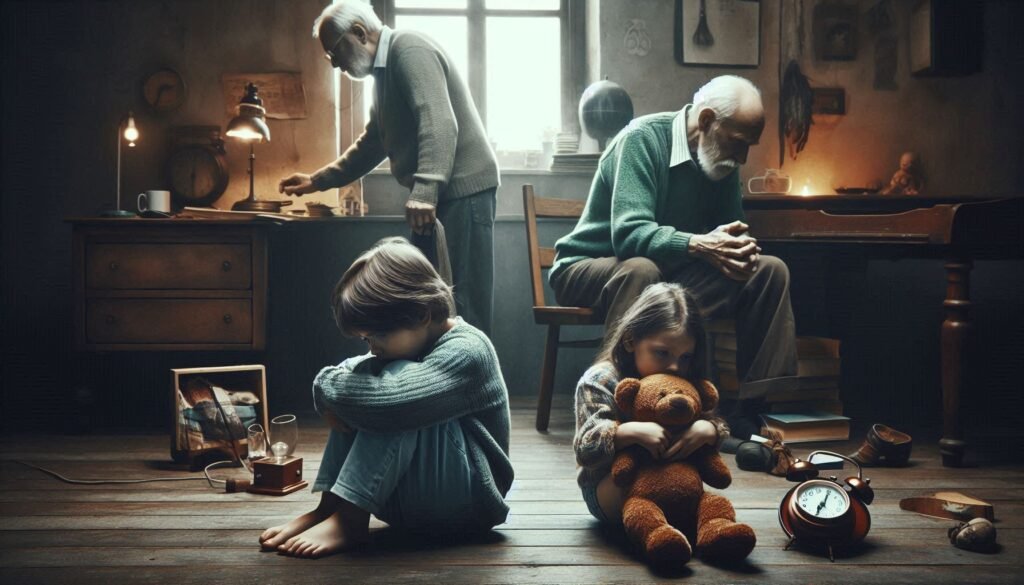Childhood is a time meant for love, security, and growth. However, for some children, experiences of abandonment can create deep emotional wounds that linger long into adulthood. This phenomenon is often referred to as Abandoned Child Syndrome. It’s a term that encapsulates the struggles faced by those who felt neglected or discarded during their formative years.
As these individuals grow up, the shadows of their early experiences can cast doubts on their relationships and self-worth. Understanding how childhood trauma shapes adult relationships is crucial in unraveling the complexities that stem from feelings of abandonment. From signs and symptoms to coping strategies and treatment options, this blog provides a comprehensive look at overcoming abandoned child syndrome.
Join us as we delve into the intricacies of abandonment issues, explore what they mean for mental health, and learn how to support both adults facing these challenges and children at risk of developing them. Your journey toward healing starts here.

All about Abandonment issues
Abandonment issues stem from the emotional trauma of feeling neglected or rejected during childhood. These feelings often arise when a child experiences significant loss, such as parental separation, divorce, or neglect. The impact can be profound and long-lasting, influencing how individuals perceive relationships throughout their lives.
“How Does X-linked Intellectual Disability Progress?”
Children who suffer from abandonment may develop deep-seated fears of being unloved or unworthy. This fear can manifest in various ways, including anxiety in social situations and difficulty trusting others. As adults, these unresolved feelings might lead to patterns of clinginess or avoidance in romantic relationships.
Moreover, the effects are not solely emotional; they can also affect physical wellness. Chronic stress related to abandonment issues may contribute to health problems over time. Understanding this connection is essential for those seeking healing and improvement in their lives.
Recognizing abandonment issues is the first step toward addressing them effectively. By acknowledging these challenges early on, individuals can begin to work through their past traumas with appropriate support and strategies.
Signs and Symptoms of Abandoned Child Syndrome
Individuals affected by Abandoned Child Syndrome often display a range of signs and symptoms that can significantly impact their daily lives.

One common indicator is an intense fear of rejection or abandonment, which may lead to difficulty forming close relationships. This fear can manifest as clinginess or avoidance in interpersonal situations.
“What Are The Signs of XMEA Syndrome?”
Emotional instability is another hallmark symptom. Adults with this syndrome may experience mood swings, anxiety, and depression stemming from unresolved childhood trauma. Their emotional responses can be disproportionate to the current situation due to past experiences of neglect or abandonment.
Additionally, individuals might struggle with self-esteem issues. They often have a persistent sense of worthlessness that affects their ability to engage socially and professionally. Feelings of inadequacy can hinder them from pursuing opportunities for personal growth.
Individuals may exhibit patterns of unhealthy relationships characterized by either excessive dependency or withdrawal. These behaviors are coping mechanisms rooted in their formative years but continue into adulthood, creating ongoing challenges in connecting with others.
Causes of Abandonment issues
Abandonment issues often stem from a variety of early life experiences. One common cause is parental neglect, whether due to physical absence or emotional unavailability. Children who feel ignored or unsupported may internalize feelings of worthlessness and fear being left behind.
“Why Does Yamamoto Syndrome Affect Muscle Function?”
Another contributing factor can be the loss of a primary caregiver through death, divorce, or separation. This sudden change can create deep-seated fears about future relationships and attachment. The trauma from such losses often manifests as anxious behaviors in adulthood.
Additionally, children exposed to unstable environments—such as frequent moves or changes in guardianship—may struggle with abandonment issues. The unpredictability fosters anxiety around stability and connection.
Witnessing traumatic events like domestic violence can also lead to feelings of insecurity and fear surrounding relationships. These experiences shape their worldview and affect how they interact with others later in life.
Fear of Abandonment in Adulthood
Fear of abandonment in adulthood often stems from early childhood experiences. Adults who faced neglect or emotional unavailability as children may develop a deep-seated anxiety around relationships. This fear can manifest in various ways, impacting both romantic and platonic connections.
“How Does Yarhosh Syndrome Impact Development?”
Individuals with this fear might constantly seek reassurance from their partners. They may overanalyze situations, interpreting any perceived distance as a sign that they are being abandoned. Such patterns can lead to unhealthy dependency or avoidance behaviors.
This heightened sensitivity affects decision-making and emotional well-being. An adult grappling with abandonment fears may struggle to trust others, fearing betrayal or loss at every turn. This creates an internal cycle of anxiety and insecurity that can be difficult to break.
Additionally, these feelings often surface during moments of conflict or change in relationships. When faced with challenges, the fear intensifies, leading some individuals to sabotage potential closeness rather than risk rejection or hurt again.
The Long-Term Effects of Abandonment and Neglect
Abandonment and neglect can leave lasting scars on individuals. Those affected may struggle with feelings of unworthiness or inadequacy throughout their lives. This deep-rooted sense of being unloved often leads to challenges in forming healthy relationships.
“What Causes Yates Syndrome? Complete Guide”
Emotionally, adults who experienced abandonment as children might exhibit anxiety or depression. These feelings can stem from a pervasive fear that others will abandon them too. Such emotional turmoil often results in a heightened sensitivity to perceived rejection.
Socially, the impact is pronounced as well. Many develop trust issues that hinder meaningful connections with others. They may oscillate between clinginess and withdrawal, fearing intimacy yet yearning for closeness.
Cognitively, these individuals might grapple with negative thought patterns about themselves and the world around them. Such beliefs can perpetuate cycles of isolation and loneliness, making it difficult to break free from past trauma’s grip.

How Abandonment Trauma impacts your mental health?
Abandonment trauma can significantly impact mental health, creating a cycle of emotional distress. Individuals who have experienced this form of trauma often develop anxiety and depression. The fear of being left alone or rejected can lead to pervasive feelings of insecurity.
“Why Does Yang Syndrome Affect Multiple Systems?”
These individuals may also struggle with low self-esteem, feeling unworthy of love and attention. This belief can hinder their ability to form healthy relationships, leading them into toxic cycles where they either cling too tightly or push others away entirely.
Moreover, abandonment issues may manifest in symptoms like panic attacks or chronic feelings of loneliness. The constant worry about potential rejection becomes an exhausting mental burden.
Coping mechanisms might include avoidance strategies that prevent meaningful connections from forming. Unresolved abandonment trauma not only affects personal relationships but also hinders overall emotional well-being and stability in life.
Diagnosing a Fear of Abandonment
Diagnosing a fear of abandonment can be complex. It often requires a mental health professional who understands the nuances of emotional trauma and attachment issues. Initial assessments typically involve detailed discussions about past relationships, childhood experiences, and current feelings.
“How Does Yashiro Syndrome Present?”
Psychologists may use various tools, including questionnaires and interviews, to identify symptoms related to Abandoned Child Syndrome. These conversations help uncover patterns in behavior that stem from early experiences with separation or neglect.
It’s vital for individuals to express their feelings openly during this process. Feelings of anxiety, clinginess, or even anger can provide crucial insights into one’s relationship dynamics.
Professionals look for recurring themes in thoughts and behaviors that indicate an ongoing struggle with abandonment fears. Recognizing these signs is the first step toward healing and forming healthier connections moving forward.
Coping Strategies for Abandonment Trauma
Coping with abandonment trauma requires a multifaceted approach. One effective strategy is to practice mindfulness and grounding techniques. These exercises can help individuals stay present, reducing anxiety related to past experiences. Simple practices like deep breathing or observing your surroundings can bring clarity and calmness.
Building a support system is vital as well. Friends, family, or support groups offer emotional validation and understanding. Sharing feelings with trusted people creates connections that counteract the sense of isolation often felt by those with abandonment issues.
Engaging in creative outlets can also serve as a powerful coping mechanism. Art therapy, writing, or music allows for self-expression and processing emotions without judgment. Finding joy in creativity helps rebuild confidence.
Setting healthy boundaries plays an essential role in healing from abandonment trauma. Learning to say no when necessary protects personal space while fostering healthier relationships moving forward.
Hypnotherapy may help Adults to Form Healthy Relationships?
Hypnotherapy can be a powerful tool for adults struggling with Abandoned Child Syndrome. This therapeutic approach taps into the subconscious mind, helping individuals address deep-rooted fears and emotional patterns related to abandonment. By creating a relaxed state, hypnotherapists guide clients to explore their past experiences without judgment.
During sessions, patients may uncover memories or feelings they have long suppressed. These revelations can lead to significant insights about how childhood trauma affects current relationships. Understanding these connections is essential for healing and forming healthier bonds with others.
Moreover, hypnotherapy fosters positive suggestions that encourage self-acceptance and security in relationships. Clients often leave sessions feeling empowered to challenge negative thought patterns that stem from their abandonment issues.
As individuals learn new coping mechanisms through hypnotherapy, they become more equipped to manage anxiety surrounding intimacy and connection. In this way, hypnotherapy serves as an invaluable resource on the journey toward cultivating fulfilling adult relationships.
How to Support Children with Abandoned Syndrome?
Supporting children with Abandoned Child Syndrome requires a compassionate and understanding approach. First, create a safe space for the child to express their feelings. Listening without judgment can help them feel valued and understood. Encourage open conversations about their emotions, allowing them to articulate their fears of abandonment.
Establishing consistent routines is crucial for these children. Predictability fosters security and helps reduce anxiety related to potential abandonment. Engage in activities that build trust, such as spending quality time together or participating in regular family rituals.
Model healthy relationships by demonstrating love and support within your interactions. Show affection through words and actions, reassuring the child that they are worthy of love despite any past experiences of neglect.
Consider seeking professional guidance from therapists who specialize in childhood trauma. They can provide tailored strategies and interventions that will benefit both the child’s emotional well-being and your parenting approach.
How are Abandonment Issues Treated?
Treating abandonment issues typically involves a multi-faceted approach tailored to individual needs. Therapy is often the cornerstone of treatment, with modalities such as cognitive-behavioral therapy (CBT) and dialectical behavior therapy (DBT) proving effective. These therapies help individuals reframe negative thoughts and develop healthier coping mechanisms.
In some cases, group therapy can provide valuable support, allowing individuals to share experiences and feelings in a safe environment. Connecting with others who have faced similar challenges fosters understanding and reduces isolation.
Medication may also be prescribed when symptoms include anxiety or depression related to abandonment issues. Antidepressants or anti-anxiety medications can help stabilize mood while addressing underlying emotional pain.
Holistic approaches like mindfulness practices, yoga, and art therapy are increasingly recognized for their benefits in healing trauma. These methods promote relaxation and self-expression, creating pathways to process past hurts effectively.
Seeking Help
Seeking help is a crucial step for individuals struggling with Abandoned Child Syndrome. Acknowledging the impact of abandonment on your life can be daunting, but it’s essential for healing. Professional support can provide guidance and tools that facilitate recovery.
Therapists specializing in childhood trauma are invaluable resources. They offer a safe space to explore feelings of abandonment and teach coping strategies tailored to individual needs. Many therapists incorporate evidence-based techniques such as cognitive-behavioral therapy (CBT) or EMDR, which have proven effective in addressing trauma-related issues.
Support groups also play a significant role in the healing process. Connecting with others who share similar experiences fosters understanding and validation. These spaces allow participants to express emotions freely while learning from each other’s journeys.
Don’t hesitate to reach out for help when needed. The journey toward emotional well-being often requires professional intervention, offering you hope and a renewed sense of purpose in relationships.
Recommendations for Adults with Abandoned Issues
Adults dealing with Abandoned Child Syndrome can benefit from a variety of strategies that foster emotional healing. One effective recommendation is to engage in therapy, particularly cognitive-behavioral or dialectical behavior therapy. These therapeutic approaches help individuals identify and challenge negative thought patterns stemming from abandonment issues.
Building a supportive network of friends and family members is also crucial. Surrounding yourself with understanding people allows for open conversations about feelings and experiences, which can lessen the burden of isolation. Additionally, consider joining support groups where shared stories can create a sense of belonging.
Mindfulness practices such as meditation or yoga offer tools for grounding emotions and reducing anxiety related to fear of abandonment. Regular physical activity is another positive outlet; it not only boosts mood but also enhances overall mental health.
Journaling your thoughts can be a powerful way to process feelings associated with past trauma. Writing provides clarity and helps you track emotional growth over time.
Outlook and Summary
Understanding Abandoned Child Syndrome is vital for fostering healthier relationships in adulthood. Childhood experiences of neglect and abandonment can leave profound impacts that resonate throughout life, influencing emotional responses and attachment patterns.
Recognizing the signs and symptoms early on can facilitate timely intervention. Symptoms may include anxiety, difficulty trusting others, or a pervasive fear of rejection. Identifying these feelings allows individuals to seek help and begin their healing journey.
Coping strategies play a crucial role in recovery from abandonment trauma. Techniques such as mindfulness practices, therapy, and strong support systems can empower individuals to address their fears constructively. Hypnotherapy presents an intriguing option for those looking to rewire deeply rooted beliefs about love and connection.
For parents and caregivers, supporting children with abandonment issues requires patience, empathy, and open communication. Building trust through consistent care helps mitigate the effects of past traumas.
Treatment options vary but often include psychotherapy focused on attachment styles or cognitive-behavioral techniques designed to challenge negative thought patterns associated with fear of abandonment.
Seeking help is essential for both adults grappling with these challenges and caregivers aiming to provide better support for vulnerable children. The path toward healing is not only possible; it’s transformative when approached with understanding and compassion.
Addressing Abandoned Child Syndrome ensures more fulfilling connections in adult life while breaking unhealthy cycles that stem from childhood trauma. Embracing this journey leads to stronger bonds built on trust rather than fear.


